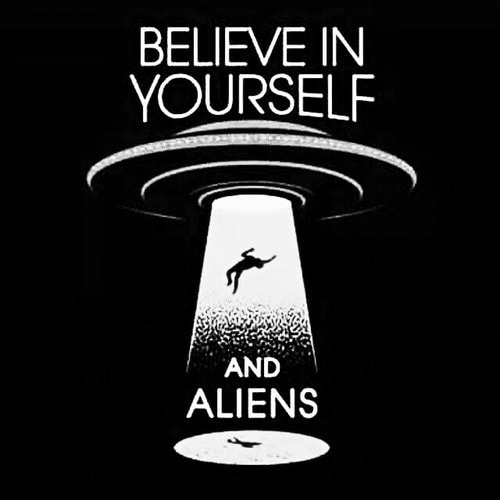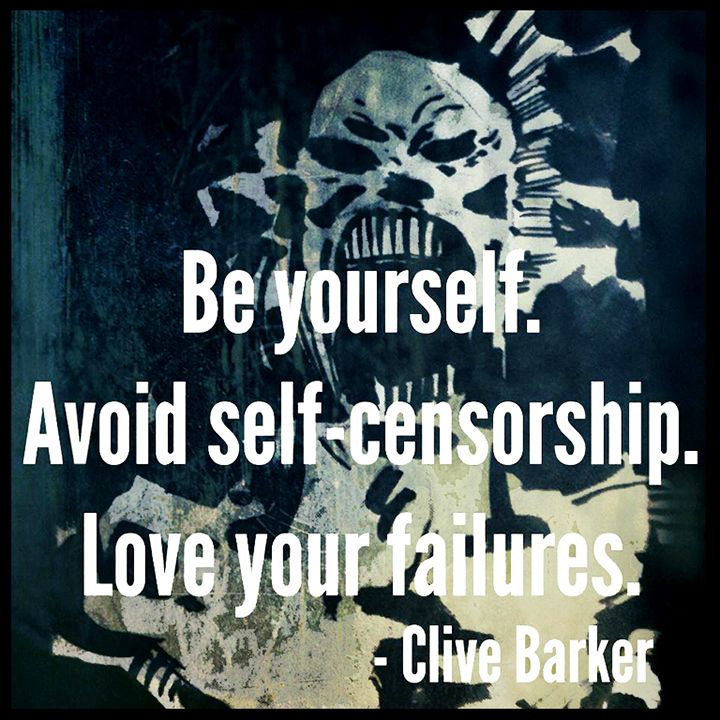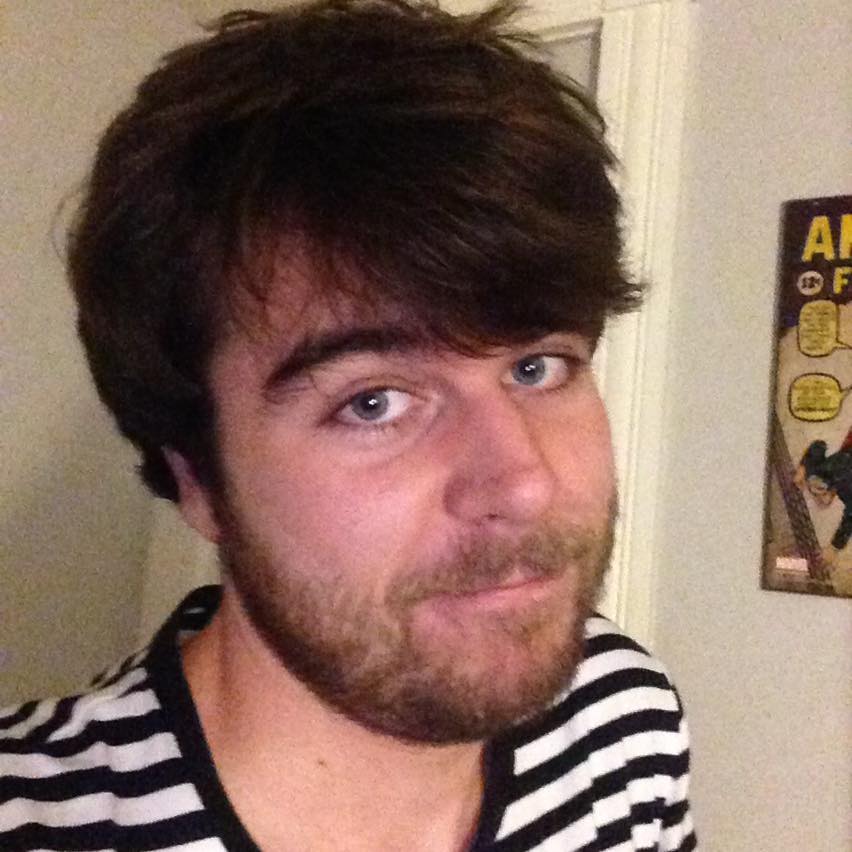|
I'm not sure if writers get growing pains, but I have something like that going on right now. After taking a three-year hiatus from writing and publishing, getting back into it feels just as pleasant as taking a stroll across a field of burning coals during a heat wave. Making the time to write and slaying the performance anxiety monster are half the battle--the other is actually trying to figure out who you are as a writer--not your process, but something a little more introspective than that.
The following questions (in no particular order) are some I've composed/complied to try to figure this all out. If you're looking to do a little self-reflection, give them a shot. Or if you're just bored and looking for a notebook prompt, that's cool too. Ready? Set? Go! What do you write? I know this sounds a bit obvious, but having some idea of what you want to do (and knowing it's not set in stone) is a good starting point. Why are you doing this, like, what's the point? Maybe you want to write to get published and have your name on the bookshelves across the country. Perhaps you have a story you want to tell that you believe no one else can. Maybe you feel like no one around you listens and you just want to be heard. What are your influences? This is the book you read in 10th grade English class that made you think you could be a writer. This is a place for your writing heroes or for the ones you don't want to be. This is where that poem Langston Huges wrote about dreams that inspired you to write a chapbook goes. These are the folks, books, ideas that got you writing and got you to where you are now. What's your inspiration? Different from influences—this is where your ideas come from. This is where you look back and cringe at all the stupid crap you did and never want to tell anyone; but then you realize you're a writer and have to tell everyone. What's holding you back? You don't think you're a good writer. You don't think you have any fresh ideas that haven't been done before. You could be worried about offending someone. You're worried about critics. You don't want to receive a rejection letter. You don't know much about writing a book or where to start. What does it mean to succeed as a writer? You want to make it on the #1 slot of the New York Times Bestseller list. Maybe you hope publishers and editors of big-name houses will beg you to work with them. Or, you want to find your “people,” and build something together through writing. What does it mean to fail as a writer? Rejection scares you. You don't want to embarrass yourself in front of a publisher. No one shows up to the reading you host. You don't sell enough books. You think your ideas suck. The book you released receives negative reviews across the board. What keeps you going? When you do fail, this is what keeps you from throwing in the towel, copping out, walking way, and other euphemisms for quitting. What are you reading right now? A poet once told me, “You write what you read.” What are you working on right now? There are writers who write and writers who “write.” Are you writing something you want to read? If you're not, follow up question, why aren't you? What are you hoping readers get out of your work? You want to tell them a good story, you know, the kind with the hero that overcomes his challenges that brings out the underdog in all of us. Your poem might be a battle-cry or a call to action. Or maybe you just want to do some Inception-like mind meddling. Do other people know that you write? Maybe your ultra-conservative parents don't know you write poems about how you lost your virginity. Or your professors who are impressed you can write a coherent sentence and think you have potential. Maybe you're out there in random internet forums posting haikus and gained a following. Have more questions? Thoughts? Post 'em below! -Maureen
1 Comment
So you're a writer? Fantastic! Have a great idea? Even better! Stuck in a rut? Well, if you're a writer, you'll probably get stuck in that rut at least once in your career: that spot where you're doing alright, but you're not really improving and maybe you're even getting bored because your writing just isn't getting better. It's one of the most frustrating aspects of writing, to be in control of entire realms and still not be able to put what's in your head down on paper properly. Writing is a career in which you are (or should be) constantly learning, so while this rut might be cozy at first, it's incredibly important that you don't stagnate. How do you improve, though? Explore outside your comfort zones. I know, I know – it's a lot easier to just stick to the areas of writing you feel safest. You can improve your strengths by practicing with pieces that no one else will ever see. If you're afraid of failure or a piece that isn't so great, remember that even failure is an improvement and a learning experience: you learn what not to do and how to improve so you can avoid it in the future! So what if you suck at writing in the sci-fi genre, poems with rhyme, or even romance? While you might not enjoy the genre as a reader, try crafting your piece in a way that would make you, as a reader, enjoy it. You'll learn how to appeal to your own audience that way; to make even the disgruntled reader enjoy your work. Practicing it means that you're allowed to stretch your mental muscles; to see your writing from new perspectives. It's like exercise, only it's a lot less painful in the physical department. Another way to improve involves your style. How do you write? Are you snappy and snarky, or do you prefer 1800s-style lengthy dialogue and descriptive language? Something in between? Try to identify your style and then attempt working on different styles of writing. You can also try writing characters with thick accents or informal speech patterns, which is more genuine but also a little more difficult to write if you're used to exercising proper grammar. Next question: do you like writing books that are dismal, or do you err on optimism? That's your tone, and it's one of the most important features of a book. To improve your own tone, experiment with different ones. Try flipping your style and write a character opposite anything you've written before. Write a story, poem, or piece of flash fiction without a happy ending, or if you're a complete pessimist, let the prince save the damsel for once. This intertwines with style in that your language portrays your tone, so try combining both of these. You can even start a story with the ending and work your way back. Doing so can allow you to more closely evaluate the typically linear timeline that stories follow. Flipping your understanding of writing can help you see your own strengths and perhaps you'll even notice something you're really good at that you've never seen before. It may also help you see where you're stuck at, if you're working on a bigger project and just can't get past a certain plot point. Now, you've probably heard this one: "You should only write what you know." Um, what? How can works by J. K. Rowling, J.R.R. Tolkien, C.S Lewis, Suzanne Collins, George Lucas, George R. R. Martin, and so many more even exist if that is a rule that good writers follow? As writers, we can improve our writing by breaking through the logic we know in our world and expanding our imaginations to accommodate. We aren't allowing ourselves to expand if we put ourselves into little boxes, and if any of those "greats" had done so, maybe we wouldn't even know their names.
Perhaps a modification is necessary to this misleading piece of advice. Include what you know about the world – what you've learned, tragedies you've experienced, how certain things make you feel, little tics you've noticed in people, etcetera – in whatever kind of story universe you want to create. This allows readers to find common ground and relate to your characters, even in the strangest of realms (even galaxies far, far away or when conversing with talking trees and-or lions.) Finally, if you're looking for a way to trim down your word count and trying to figure out how to be more concise, try some flash fiction. There are prompts and challenges all over the Internet, like 6-word horror fiction, 5-word stories, and the like. Flash fiction is a very unique way to hone your skill with conveying your point in as few words as possible; a great exercise if you're wordy (like me, in case you haven't noticed. Oops). Plus, it's a really quick way to practice, even out in public or at work, as long as you have a scrap of paper and a pen. This is a big thing right now in magazines and journals, so you might even submit some of your better exercises for publication: win-win! In short: write what you want, but make sure you're expanding and exploring constantly. Additionally, read as much and as diversely as you write; never is reading a waste of time when you are a writer (unless you're using it to procrastinate). And remember that you shouldn't view every single piece as something you can make money off of, and doing so can actually be very crippling and detrimental to your motivation (especially if you have self-doubt or a lack of confidence). Most importantly of all, have fun with it; practice makes perfect. Exploring new ways of writing can help you improve your current mode. Finally, think about defining your career by what you want to see in literature, not always what you think others will want. Chances are, someone else is waiting to see the exact same thing! Find Michaela Bush at: Facebook:https://m.facebook.com/tangledupinwriting/ Amazon: https://www.amazon.com/Michaela-Bush/e/B01JM6MOOM Thank you so much to your contribution to our page, Michaela!
There's a lot of shit-flinging in my articles. I like teasing other authors and poking fun at myself. I try to provide other perspectives, the kind that I don't see anybody else providing, and avoid the platitudes. Nobody needs to hear another cliché, right? Sometimes, it's as exhausting to avoid conventional phrasing as it is to repeat the same tired idioms. It's easy to get all tangled up in the politics of writing and the differences in business practices. My favorite lyric of all time is, “It's so easy to laugh. It's so easy to hate. It takes strength to be gentle and kind.” Even in the cut-throat book game, I think it's important to set aside our differences and remember why we're all here.
https://www.youtube.com/watch?v=ah2NgBVC1ps
We're here, because, for whatever reason, we love books. We love reading and writing, whether we prefer the smell of a new hardback or the convenience of an e-reader. We want to see great books get published. We to see books connect with audiences in ways that people never thought would be possible. Reading/writing isn't exactly a social activity, even if you are a part of whatever literary community or book club you participate in. It's a generalization, but I think there's some pocket within every writer's heart that is, well, just alone. I'm not going to talk the craft up in the way I can seldom stand or pretend that we have any emotional acuteness or depth nobody else can fathom. I truly don't believe book people feel anything that nobody else has felt. We're oddballs but we aren't a different species.
What does separate us is that we took those feelings and made something of them. We set out to write the book we've always wanted to read. We filmed the movies of our dreams so that others could see them. We've faced the critics, some of us were even able to befriend them. (Seriously, book critics are some of the coolest people I've ever met, petty jabs aside.) Even the worst books require effort. It's a massive undertaking in many ways. It takes a lot of patience with oneself to take a formless lump of clay and try to shape it into the image we imagine it to be. The blank page is a mirror that we fill with our own self-image. No matter what we write, we're relaying the human experience. One needs to fish within oneself to find that emotional resonance. It takes a lot of personal awareness and a lot of honesty in order to do properly. It can be painful. Sometimes, confronting yourself or even your own idea of self can be painful. I'm stinging from it right now. We all relate to Luke Skywalker because (to some diminished degree) we've felt or can imagine the emotions he feels throughout the movies, not because we have experienced the same circumstances. That isn't an easy thing to do. I'm not saying we all pull it off. Shit, I doubt that I ever have. My point is that to take our abstract thoughts bring them into the world in a way that another person to appreciate is no small feat, no matter what it is you're writing.
https://www.youtube.com/watch?v=6omZ5GsuGrI
Or, maybe nobody will like your story. That's a possibility. You could spend years on a project and it could totally flop. It's happened to me more than a few times. What's it matter? Do you write for praise? Did you program your laptop to make a cha-ching sound every time you hit the enter button? You're not guaranteed any pats on the back in life, no matter what you do. What you do is you keep on doing what you're doing to the best of your abilities, if that's what you want to do. That's the only thing that matters. You're making it happen. You're living your dreams, even if reality is a little more HD than you imagined it to be and you can see all your own scars and unpretty details. All that matters is that you're up there, onstage, and you owe it not only to yourself but the audience to give your best performance. Regardless if you're Montague or Capulet, we're all up here together.
-Shoddy Toddy I always tell people, “You don't get laid for writing books.” That's a pretty thought, but I can confirm that it isn't true. The sad reality is that there's a ton of posturing in the literary world. There are tons of Chads and Stacies that would push poor Kafka into a locker and then start viciously making out leaning against that same locker. Shit, I'm probably a Great Value lit answer to Bender from The Breakfast Club. (Would that just be called The Book Club? Fuck me...) The book world really isn't all that far off from high school. We're all awkward and trying to sell ourselves when we hardly even know who we are. Genres are just the cliques we wedge ourselves into. Financially successful and established writers are the teachers and coaches we mimic in shortcuts to identity. Editors are fucking nerds, but more so the chill kinda nerd that smokes pot while playing D&D. What I'm tryin' to say is that despite all our marketing, all the interviews, the readings, and the tweets that only other literary-minded people could possibly understand, it's nothing but foreplay. The thing with books is that they require patience. You write a song and it takes three minutes to play on guitar, or kazoo, or whatever instrument you play, five minutes tops. (What? You wrote an eight minute song for your crush in high school? The fuck did you take yourself for? Zeppelin?) Make a movie and it asks about two hours of an audience. Reading a book is an investment. You're practically asking someone to do homework. Then you expect to have a conversation about it? Homie, that's a book report. Now, I'm not saying that producing a book is any harder to do than those other examples. Quite frankly, as someone whose tampered with all three (I don't mean to brag but my kazoo always brings the house down at parties.), writing books was by far the easiest. It's just you at the desk on your own time. (There's a great Hank Moody quote about writing just being about what you come up with when your butt's at the desk and how everything else is playing dress-up. I might've jacked that idea for this article...) No scheduling, little-to-no technology, no financial burden. I've read some tweets about how being an author is just as difficult as being a carpenter. Frankly, I think that's uncut bullshit, but the craft doesn't come without its challenges. The heaviest burden I've encountered as a writer is the solitude that comes with the territory. Reading really is kind of like fucking. I'm no Casanova, but I've been publishing for a decade and my readership's only dwindled, so it might be the aptest comparison for me. Asking someone to read your book is like making love with a runny nose, or during a bout of chronic flatulence. It's about as intimate as you can be with someone and you're also risking the worst kind of embarrassment. It doesn't matter if your work is pure fiction, or if there isn't an ounce of autobiography between the lines. You can wear whatever brand you like, and you can sell yourself however you like, but once you're between the sheets with a reader, it's all about performance. When I was on my man, Eric Zavinski's podcast a year back, I talked about every time your significant other is reading someone else, it's kind of like getting cheated on. Call it fragile masculinity or possessiveness, but I stand by that statement. A player just wants his girl to wear the jersey with his number on the back is all, ya know? You want to pleasure your reader; you want to take them on a ride that'll make their fucking eyes water. Then, of course, you want that pillow talk where they tell you how amazing you are. -Todd The Bod
What am I getting at? I don't remember. We really need to hire some content creators, because I'm fishing around in my pocket for loose change and coming up with lint, here. If you wanna do your boy a solid, send us your worst so we can get hits off it. Don't worry, we'll include a link to your twitter, or whatever. Jesus. Writing this fucking article is the last thing I want to do right now and yet there's nothing I'd rather be doing. My cat's lying beside me and I'm listening to Pet Sounds. I should be DTF (Down to Function?) with this thing, but the ambition just isn't there. I feel stupid, impotent, like the biggest jerk in the universe, and have absolutely no right pretending to be writing from any position of authority. I don't really understand how I plan to release other people's books when I can't even figure out how to sell my own. I'm big-headed and don't have the muscles to back it up.
I don't have any outline for this post. I'm distracted. My thoughts keep drifting below the belt and I'm wondering if I'm so repressed because of a turbulent past or because I'm incapable of living in any one moment. On one hand, I need to move forward with my life, but on the other hand, there's some shit that needs set straight for the record. But then, being a jerk to vindicate myself would only prove myself to be the jerk I was made out to be? So, it's just another lose-lose situation. I can't express myself properly and that makes the people around me uncomfortable. My body's in a constant state of pain and I have to roll my wrists and ankles, which makes a bony popping sound that makes me, if not everybody else in my vicinity uncomfortable. My arms are always stiff at my side and I've never danced in my fucking life. I'm quick to criticize and afraid to compliment. Then I go and write some whack shit like this on my publishing house's blog as though that counts as productivity. I had planned on writing a blog post about some lame-ass advice Neil Gaiman wrote about ignoring logical criticism and how I think that if that isn't an example of anti-intellectualism, then what is. Somehow, dissing on Gaiman feels like punching down for me, and wouldn't be that fun. Then, I could write about how to collaborate, but what the fuck do I know about collaboration? You see The Renaissance Men around? I haven't in well over two years. I'm pressing my wrist down so hard on the keyboard it looks like there are cuts across it. If I could figure out how to work that into a singular visual, that could serve as the upcoming e-Mo/Anti-Counter-Culture rerelease scheduled in the next year or so. If you actually read this far, why? Are you some kind of voyeur? Do you hate me? If so, those are two things we can see eye-to-eye on, so there's that. If you want to write, or do anything in life, there's really only one thing you can bring to the table, and that's yourself. There will always be someone with better grammar than you, more impressive reference points, more publishing experience. There'll always be a face better prepared to be sold on a back cover than yours. There is no hierarchy of authors, necessarily, but I do think that's an indisputable fact in that it's so obvious that it isn't a concept worth wrestling with. My point is, and I'll make it quick because I'm thinking (hoping) that I'm drifting off as I type this, that the only unique asset you have is yourself. Nobody else has lived your life exactly, and nobody but you is you. That seems obvious, but only because it is. The trouble is that not everybody is going to want you. First off, you're going to have the haters. I was never big on that term and I'm still not, but there's a lot of clique-ishness in the literary world. It really can feel like Mean Girls at times. “Oh? Another book about a character discovering himself/getting over a past trauma/[insert story trope here]? Like the world needs more of those.” Usually, I try to avoid strawmanning but a series of viral images with book covers mocking the various tropes getting shared by writers and publishers alike kind of proved my point to me. (I also don't like citing examples without citations, usually, but I never saved the images and you'll just have to fucking trust me on this one thing, God dammit. If I find them again, I will share them retroactively on this post.) Simply put, some people just won't meet you with open arms. Did you ever see that episode of Recess about how some people just aren't going to like you no matter what you do? I didn't, but I saw some anons discussing it on 4chan the other day while I rode the bus. It's like what I imagine that episode to be like. Most importantly, this whole “be yourself” platitude is about honesty. You have to keep it real with yourself and know who you are and what you're about. That isn't as easy as it sounds. Back to the collaboration thing, you have to be real with whoever you're working on it, be that a co-director, editor, or coauthor in terms of what you wish to accomplish and how to accomplish that. You'll be seen as an egotist if you don't bow down to any criticism but you'll be a coward if you don't put your foot down on some of your hard-line values. I played a huge role in the dissolution of Renaissance Men by not having the emotional intelligence or confidence to do so. Now, you're probably not asking yourself, “But, Todd Daniel Crawford, author of such classic flops as The Final Gospels and L'Pilgrimage, how can I be honest if I write fiction?” You just have to listen to the story and find what's right. When I get stuck, I'll just start asking myself questions about what would happen next, knowing the characters and flavor of the story. I don't have the tools to demonstrate for you exactly how that process works but I think you'll know once it starts working for you. Look around the room you're in. Then, close your eyes and try to imagine what the room looks like in your mind. That's kind of what it's like bringing the idea of a book to life. That might sound simple but it's something very few writers, very few people are willing to do. Think about charming demos from a young band before they break it big. Then think about the polished sound of something like Coldplay. Which would you rather sound like? Exactly. Right now, I'm trying to figure out how to fill in the blank spots of the room I'm illustrating for you people, but my memory's a bit hazy. I'm sure there are more clothes on the floor, some posters on the wall that I'm leaving out, but I'm fucking tired and when I sat down to write this, I never actually thought I'd get around to finishing it. -Honest T I'm only going by the moniker, “Honest T” for this one article. I mean, that would be ridiculous if I actually ever used it more than once. It really isn't worth even a one-off, it's so corny. |
CategoriesArchives
August 2023
|









 RSS Feed
RSS Feed